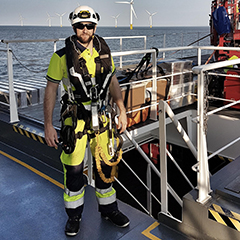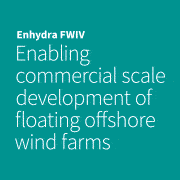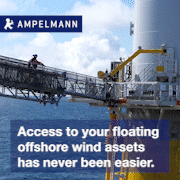Paramedics will be working on two offshore wind projects off the East of England coast in new contract awards for pioneer SSI Energy.
The first company to supply highly-trained life-saving dual role technicians has won its first long-term offshore contract as part of the operations and maintenance team on the Greater Gabbard Offshore Wind Farm (GGOWF) off the east coast.
The company has also landed a contract to supply paramedics during construction of the 714MW £2.5bn East Anglia ONE with renewable energy vessel specialist Turner Iceni after the success of its offshore wind contract on the Galloper Offshore Wind Farm construction.
Employing the paramedics, who have undergone technician training, means lives can be saved offshore in the “golden hour” in medical emergencies such as strokes, heart and asthma attacks and anaphylactic shock, as well as the full range of traumatic emergencies including open fracture, and falls from height.
Duncan Higham, SSI Energy managing director, said it provided a significantly higher-grade service to that offered currently by technicians with first-aid training. It also allows the incident of false reporting to be cut significantly.
“This can make significant cost-saving to operators as paramedics are far more capable of diagnosing correctly and have a significant protocol of drugs at their disposal as well as SSI doctor support to enable them to carry out treatment offshore without having to return a patient to the base unnecessarily. That said, when something serious does happen, they are much more likely to recognise the signs and symptoms early ensuring the ERP is swiftly enacted.”
Two paramedic-technicians are now working on shifts at GGOWF. One has started on the East Anglia ONE project, 30 miles off the Suffolk coast, and will be joined by another in the summer.
The model was developed with the help of a £50,000 grant from SCORE ((Supply Chain innovation for Offshore Renewable Energy).
Mr Higham said SSI medics had already saved lives on wind farms and the message about their value was getting through.
“As sites are moving further and further offshore and people are occasionally getting hurt, companies are realising that a first aider cannot do everything while an offshore paramedic has the proper life-saving expertise to make a real difference.
“You can have 10 first aiders but it isn’t as effective as having one paramedic. Our medics have dealt with a stroke and a cardiac arrest and other medical emergencies on onshore wind farms.”
On ‘weather days’, when technicians have to be stood down, the paramedics will offer health sessions, focused on mental health, symptoms and treatment of medical and trauma emergencies as well as general first aid.
Without paramedics, the only medical cover is provided by fellow technicians who are required to undergo only the two-day GWO (Global Wind Organisation) first aid course, compared to the minimum of four years training paramedics undergo. This service enables patients and casualties to get expert help in the “golden hour” which is vital to boosting chances of recovery and a return to work
“Even though the advanced GWO first aid course has put on an extra day it cannot solve the issue of the complexity of providing life-saving care in one day. Most of our medics have more than 15 years’ experience.
The paramedics will work with Lowestoft-based renewable energy vessel specialist Turner Iceni who won a contract worth more than £4m to provide support for the construction of the East Anglia One.
Richard Thurlow, director of Turner Iceni, said: “As offshore wind farms are being built further offshore it is increasingly important to have qualified medics during the installation and construction period. Having the capabilities and experience SSI team have on-board the Turner Iceni vessels will not only bring a level of comfort to technicians but to our vessel crews as well .”
Kenny Beardsell, site manager of GGOWF, said: “The health and safety of our highly-trained technicians and contractors during operations and maintenance is our number one priority, so having a trained medic working within the team makes sense.
“The added value of these technicians is that they run health awareness sessions, discussing symptoms to illnesses, mental health and first aid during downtime in bad weather. Collaborative assistance and input is also given to our emergency response planning and regular emergency response exercises. We have medics on site during these weather periods so we can use them for a wider benefit.”
Mr Higham said there were multiple paramedic technicians working for GE in Europe and had been providing expert medical care for the last three years..
“The aim is to have one medic technician in each team of around 24 to 36 workers. SSI’s medics also help with primary health screening – signposting workers with health issues to visit their GPs – and look at staff wellbeing, to aid their physical and mental health.”
A £50,000 grant from the SCORE (Supply Chain innovation for Offshore Renewable Energy) scheme which promotes new ideas and efficiency improvements in offshore renewables had supported development of the model.
The oil & gas industry has placed a medic, or in some cases a doctor, on platforms, rigs and vessels for three decades. Now, as wind farms are further offshore, the need for having greater medical protection is exactly the same, Mr Higham said.
“Wind farms are pretty safe but if someone gets hurt or taken ill it could be a long wait for a helicopter or lifeboat.
“In the case of a heart attack, if the casualty had been up an 80m turbine offshore, he would have been unlikely to survive for any length of time (+10mins), with only a first aider on hand.”
As well as Ireland, SSI Energy currently has paramedics working on wind farms in Poland, Ireland, Scotland and Wales as well as offshore medics at various oil and gas companies globally including off West Africa, Australia and the Middle East.
Many are ex-servicemen who use their military robustness and enthusiasm in the new field of offshore energy.
Rob Bush, SCORE project manager, said: “This is exactly what we want to see – another example of a company coming to SCORE with a really innovative model, developing it and going on to win a stream of contracts that also brings a new concept and employment to the area.
“It fits perfectly with our aim to unleash great new ideas which lower costs and increase efficiencies in offshore renewable energy.”
SCORE offers grants to help companies across England to develop new products, processes and ideas – from patenting a product to exploring concepts that offer new ways of solving problems and driving efficiency in offshore renewables.
Grants are available to start-up and established companies for up to 40% of eligible costs or £50,000, whichever is the lower, with a minimum grant of £2,500.
Companies can also access up to 12hrs of subsidised business support from regional enterprise agency Nwes to help grow and develop their business.
www.scoregrants.co.uk
www.ssi-energy.com
ABOUT SCORE
The Supply Chain Innovation for Offshore Renewable Energy (SCORE) programme is part-funded by the European Regional Development Fund (ERDF) and is open to companies with fewer than 250 employees and an annual turnover of less than 50 million euros.
The funding is designed to help companies in a wide range of areas, including research and development, collaboration with universities and research bodies, securing patents, acquiring specialist equipment or services and investigating the commercial viability of processes and technologies.
Companies can also access up to 12hrs of subsidised business support from regional enterprise agency Nwes to help grow and develop their business.
The current programme is delivered by the Nwes, the largest enterprise agency in the UK and in partnership with energy industry experts Nautilus Associates and the National Offshore Renewable Energy Catapult centre.
Follow SCORE on Twitter at @SCOREgrants





























